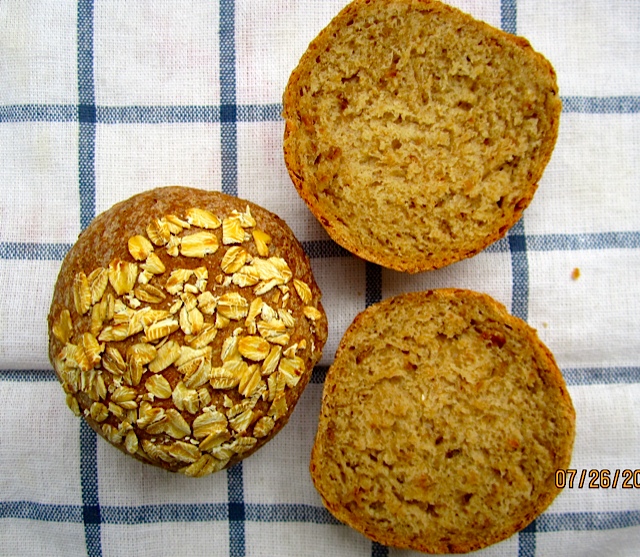
1971, when I was a student, I traveled with my best friend, Andrea, through England, Cornwall and Wales. We didn't have a fixed itinerary, we just followed our nose to places we had read or heard about.
We didn't stay in hotels (only once, and that was as dusty as it was expensive), we preferred B&Bs, always looking for interesting old buildings. We slept in grand manor houses, rustic inns, cozy farm houses, and even a water mill from the sixteenth century.
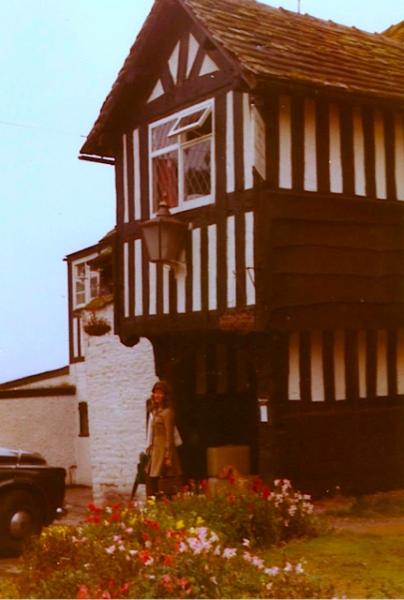
People always complain about the English food - I never had a really bad experience, I would always find something I liked, as long as it started with "apple" and ended with "pie"!
We often ate in pubs, having sandwiches with cheddar and chutney, and I was delighted to try the different beers.
With all these fond memories in mind - no wonder I wanted to try master baker Dan Lepard's Alehouse Rolls. You will find it in his book "Short and Sweet", or here.
I had just bought Newcastle Brown Ale at the Bangor commissary, and thought this was very appropriate for British rolls.
The dough is made with a hot beer soaker - ale and oats are brought to a boil, with butter and honey added to the hot liquid - and the rolled oats are toasted.
It also has some whole grain flour, to make the rolls even heartier (and give health conscious bakers a better conscience!)
Dan Lepard has a nice, minimalistic approach to working the dough, he handles it gently, kneads it very briefly, and allows it to develop while resting (autolyse).
As a psychotherapist this method appeals to me a lot: give the patient dough the means and time to develop, without pushing and hectoring - and it will grow just fine!
I chose rye as whole grain flour, and had to add a little more water to achieve a soft, slightly sticky dough. Instead of letting the dough rest for a final 30 minutes on the counter, I did what I usually do - and put it to sleep overnight in the fridge.
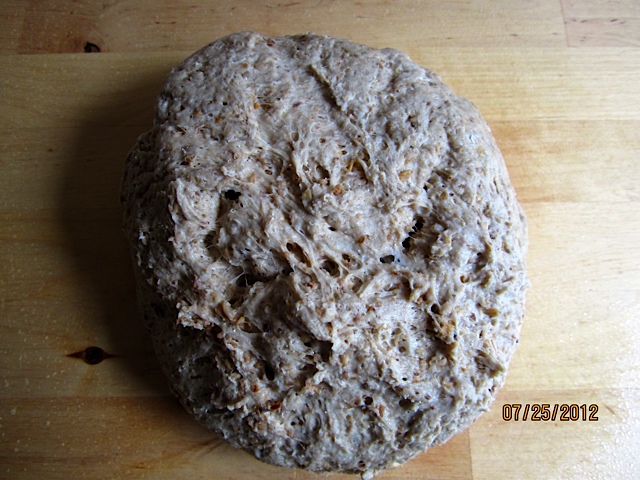
This cold fermentation of the dough fits much better in my schedule than doing it all on one day. Though I like baking in the morning, I don't want to get up in the wee hours, so I prepare everything the day before, and only have the shaping and baking left to do.
Having to choose between large sandwich rolls (à 235 g a piece) or smaller dinner rolls, I opted for the more petite version - 12 rolls à 92 g.
The recipe suggests rolling the rolls first over wet kitchen paper towels and then in oat flakes. I didn't read the instructions thoroughly, and, therefore, dunked only the tops in the oat meal.
Whereas the giant sandwich rolls have to bake for 20 minutes at 210º C/410º F, and then some more at reduced heat, my little rolls were golden brown after 26 minutes (without reducing the heat.)
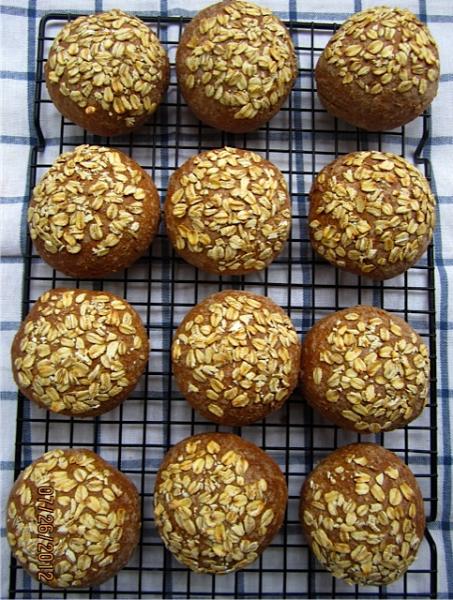
They tasted just as good as they looked, a semi-soft crust with a little crunch, and a hearty, somewhat nutty flavor.
And, since I am a stickler to etiquette, I didn't dream of pairing them with anything else but traditional Newcastle Brown Ale!
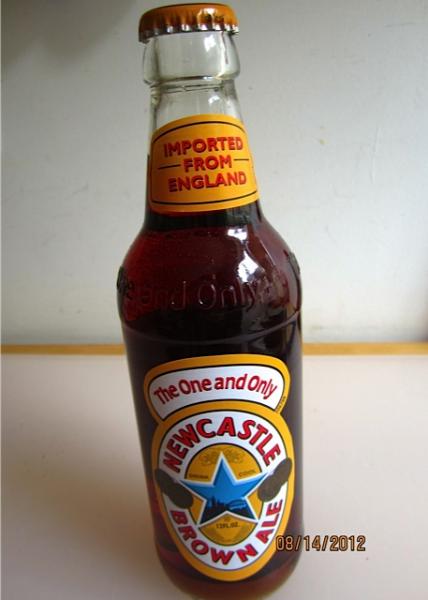
- hanseata's Blog
- Log in or register to post comments
Like your approach to psychotherapy and dough making. Beautiful looking rolls, too.
All the best,
Syd
Very elegant rolls karin. Crust looks beautifully colored, and the crumb looks soft, and wholesome. I love the rolled oat garnish, very cute! Where were you?
Hi Karin,
Lovely write up and rolls. Now I realise that I am [sort-of], an adopted Geordie, but to be honest [and much as I love beer], I've never liked Newcastle Brown Ale. I guess I'll not hear the last of this!
Best wishes
Andy
and I'm guessing the beer soaker really puts these over the top. With the oat decorations your rolls are nice looking as well . Bet they taste great. With rolls like these, no on would need much psychotherapy except after they were gone of course :-) I'm going to need some.
The spell checker said I spelled soaker wrong (I had an i in it) and recommended I use soaker insread of soiaker. So I did. It then sais that soaker isn't a word and suggested I use sake or sicker instead. Sake makes more sense as a soaker of course but I am much sicker now for some reason :-)
Nice baking Karin
Those look delicious, Karin! A couple of these rolls, some cheddar, and a pint would go down very, very nicely. Thanks for sharing.
Marcus
Syd, the strange thing is, that it is my husband who always comes up with analytic interpretations (he had one semester of psychology back in the days). He calls my baking: "The Other Man", and my working the dough: "suspiciously sensuous fondling"!
I wonder what he is suppressing?
Karin
My husband broke his foot in July, and wasn't allowed to put the slightest weight on it. With my summer schedule of baking for the natural food store, and an invalid at home, I didn't have a lot of spare time.
Fortunately the fracture is now closed, I have more time for doing fun stuff - and my husband has almost finished recording a CD with his own guitar compositions, thanks to being forced to stay in one place, whether he wanted or not.
Karin
those definitely look good enough to eat! I like Marcus' menu suggestion, too. ;)
Paul
I'm glad you enjoyed reading my post, Andy, and here is my question for the expert:
What kind of beer would you choose when a bread recipe, like this, gives you the choice between brown ale and stout? I'm always wondering, because I like both (Newcastle Brown Beer is nice but not my favorite, either).
I know that Guinness Draught is best for longer cooking, like stew, because it keeps its malty taste. But "Cook's Illustrated" claims that a light beer, like Bud Light (shudder!) is best for bread baking, because it is so bland.
Karin
Hi Karin,
I can't agree with Cooks Illustrated, I'm afraid. I can't see the point of using light ale/lager as the liquor in dough, as the flavour will just not be detectable in the finished bread. Given these beers are pasteurised, there is no contribution to yeast fermentation either. And, beer costs a fortune compared to tap water, so it's just a crazy idea to use light ale!
Using a strong pale, or, brown ale, proper lager such as Budweiser Budvar [not the awful US imposter Bud], or good dry stout would always be my recommendation. But I meant to drink; Newcastle Brown Ale just tstes of caramel to me, there is no complexity in the flavour coming from either malt or hops. There's little traditional about it these days, I'm afraid, and it isn't even brewed in the North East of England anymore!!! It's terribly over-rated, but it will work well as the liquor in bread, I'm sure.
Best wishes
Andy
You are right, and I just realized - "Cook's Illustrated" Bud Light recommendation was for a faster "no knead" bread than Lahey's, to substitute some of the water, not for the taste (I haven't tried it, yet).
I appreciate your input because I want to try another bread with beer. We have some really nice local beers from micro breweries here, and I like to use some of these.
Best wishes,
Karin
Dabrownman, when I use my English cell phone for German text messages , it auto corrects in the most annoying way, wreaking havoc with my message. And when I try the Bing translation options for foreign language texts online, the result is usually hilarious.
Thanks for making me smile,
Karin
I absolutely agree. That's how I like it, too.
Karin
and you are so right.
Karin
Very nice rolls. I'm partial to a nice Stout in bread. Nothing against Cooks Illustrated but I like to taste the beer in my bread. A SD or yeast water version if this recipe could be real tasty too.
I agree. Interesting to try this with a starter, I'm sure it would taste good, too.
Karin
Beautiful rolls, Karin! Your breads always has me salivating. :P
And try them out, they are less tricky than the struan.
Happy baking,
Karin
Your rolls are always so uniform and the toppings so obedient! Nothing ever seems out of place. When I add toppings most end up on the counter or the floor. The dogs love it when I attempt a topping.
Think I will have to give these a go but with my current YW instead of beer....no beer in this house so I ad-lib with what I have on hand. A fun little challenge :-)
Thanks for the post and another recipe to add to my 'to bake' list.
Glad to hear that your husband's foot is on the mend and that his 'time out' resulted in a CD of his original music. Quite an undertaking and accomplishment indeed!
Take Care,
Janet
It works better, if you dip the rolls into the topping, instead of sprinkling it on, the coating is much more uniform.
What about trying hard cider instead of beer?
My husband is a really good classical guitar (and lute) player, who already produced a CD with Baroque music a long time ago. But he is also a perfectionist, and never quite satisfied. But now he had so much time on his hand, that he he really got going, and we had a recording engineer here for the last weekends, so it's finally going to happen.
Take care, Janet,
Karin
Karin,
What I have used is apple cider spiked with a bit of leaven for 12 hours before being added to the dough. A trick I learned from another one of Dan's recipes. His Scrumpy Buns. A favorite here and easy to do.
I will have to attempt your method of applying toppings next time I brave a bun such as this. :-)
I understand the perfectionist thing. Maybe the foot thing wasn't an accident after all.......but an opportunity.
Take Care,
Janet
They look gorgeous. I love DL, he's my most esteemed baker! This recipe is definitely a goodie.
Oddly, I retarded this dough, despite his warning not to let it prove that long given all the sugars/malt in the ale. Nothing happened, it barely moved overnight (about 18 hrs) on minimal yeast (1/4 tsp instant, actually, it may have been fresh :o). Anyway, the most spectacular thing happened when I baked them. They bloomed like an exploding ball of dough, and still, to this day, years later, remain my best looking rolls. Taste-wise, just the thing for some good cheese.
I won't pass comment on cider/ale/stout. I think I used a no-name kentish type, since we're neighbours I could not be disloyal. Can it matter? Nuances in flavour get destroyed in the oven....
(And I agree, apple pie is worth the trip over for. But then again, MacDonald's fried "Apple Pie" in a rectangular form is quite gorgeous too.)